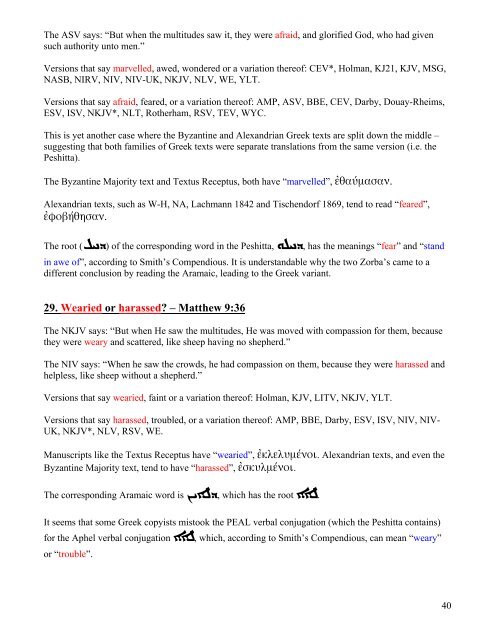Was the New Testament Really Written in Greek? - The Preterist ...
Was the New Testament Really Written in Greek? - The Preterist ...
Was the New Testament Really Written in Greek? - The Preterist ...
Create successful ePaper yourself
Turn your PDF publications into a flip-book with our unique Google optimized e-Paper software.
<strong>The</strong> ASV says: “But when <strong>the</strong> multitudes saw it, <strong>the</strong>y were afraid, and glorified God, who had given<br />
such authority unto men.”<br />
Versions that say marvelled, awed, wondered or a variation <strong>the</strong>reof: CEV*, Holman, KJ21, KJV, MSG,<br />
NASB, NIRV, NIV, NIV-UK, NKJV, NLV, WE, YLT.<br />
Versions that say afraid, feared, or a variation <strong>the</strong>reof: AMP, ASV, BBE, CEV, Darby, Douay-Rheims,<br />
ESV, ISV, NKJV*, NLT, Ro<strong>the</strong>rham, RSV, TEV, WYC.<br />
This is yet ano<strong>the</strong>r case where <strong>the</strong> Byzant<strong>in</strong>e and Alexandrian <strong>Greek</strong> texts are split down <strong>the</strong> middle –<br />
suggest<strong>in</strong>g that both families of <strong>Greek</strong> texts were separate translations from <strong>the</strong> same version (i.e. <strong>the</strong><br />
Peshitta).<br />
<strong>The</strong> Byzant<strong>in</strong>e Majority text and Textus Receptus, both have “marvelled”, θαúµασαν.<br />
Alexandrian texts, such as W-H, NA, Lachmann 1842 and Tischendorf 1869, tend to read “feared”,<br />
φοβθησαν.<br />
<strong>The</strong> root (Lxd) of <strong>the</strong> correspond<strong>in</strong>g word <strong>in</strong> <strong>the</strong> Peshitta, wlxd, has <strong>the</strong> mean<strong>in</strong>gs “fear” and “stand<br />
<strong>in</strong> awe of”, accord<strong>in</strong>g to Smith’s Compendious. It is understandable why <strong>the</strong> two Zorba’s came to a<br />
different conclusion by read<strong>in</strong>g <strong>the</strong> Aramaic, lead<strong>in</strong>g to <strong>the</strong> <strong>Greek</strong> variant.<br />
29. Wearied or harassed? – Mat<strong>the</strong>w 9:36<br />
<strong>The</strong> NKJV says: “But when He saw <strong>the</strong> multitudes, He was moved with compassion for <strong>the</strong>m, because<br />
<strong>the</strong>y were weary and scattered, like sheep hav<strong>in</strong>g no shepherd.”<br />
<strong>The</strong> NIV says: “When he saw <strong>the</strong> crowds, he had compassion on <strong>the</strong>m, because <strong>the</strong>y were harassed and<br />
helpless, like sheep without a shepherd.”<br />
Versions that say wearied, fa<strong>in</strong>t or a variation <strong>the</strong>reof: Holman, KJV, LITV, NKJV, YLT.<br />
Versions that say harassed, troubled, or a variation <strong>the</strong>reof: AMP, BBE, Darby, ESV, ISV, NIV, NIV-<br />
UK, NKJV*, NLV, RSV, WE.<br />
Manuscripts like <strong>the</strong> Textus Receptus have “wearied”, κλελυµéνοι. Alexandrian texts, and even <strong>the</strong><br />
Byzant<strong>in</strong>e Majority text, tend to have “harassed”, σκυλµéνοι.<br />
<strong>The</strong> correspond<strong>in</strong>g Aramaic word is Ny0ld, which has <strong>the</strong> root 00l.<br />
It seems that some <strong>Greek</strong> copyists mistook <strong>the</strong> PEAL verbal conjugation (which <strong>the</strong> Peshitta conta<strong>in</strong>s)<br />
for <strong>the</strong> Aphel verbal conjugation 00l, which, accord<strong>in</strong>g to Smith’s Compendious, can mean “weary”<br />
or “trouble”.<br />
40

















